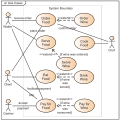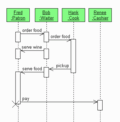- Object Management Group
-
Object Management Group 
Formation 1989 Headquarters Needham, Massachusetts Website www.omg.org Object Management Group (OMG) is a consortium, originally aimed at setting standards for distributed object-oriented systems, and is now focused on modeling (programs, systems and business processes) and model-based standards.
Contents
Overview
OMG provides only specifications, and does not provide implementations. But before a specification can be accepted as a standard by OMG, the members of the winning submitter team must guarantee that they will bring a conforming product to market within a year. This is an attempt to prevent unimplemented (and unimplementable) standards.
Other private companies or open source groups are encouraged to produce conforming products and OMG is attempting to develop mechanisms to enforce true interoperability.
History
Founded in 1989 by eleven companies (including Hewlett-Packard, IBM, Sun Microsystems, Apple Computer, American Airlines and Data General), OMG's initial focus was to create a heterogeneous distributed object standard. The founding executive team included Christopher Stone, Richard Soley, Bill Hoffman and John Slitz. The current leadership includes Chairman and CEO Richard Soley, President and COO Bill Hoffman and Vice President and Technical Director Andrew Watson.
The goal was a common portable and interoperable object model with methods and data that work using all types of development environments on all types of platforms.
Today, over 800 companies from both the computer industry and software-using companies from other industries are members of OMG. Since 2000 the OMG's International Headquarters are located in Needham, Massachusetts.
As of June 2006 the latest version of UML is 2.1, MOF is 2.0 and XMI is 2.1.
In 2006 the BPMN language specification was adopted as a standard by OMG.
In 2007 the Business Motivation Model (BMM) was adopted as a standard by the OMG. The BMM is a metamodel that provides a vocabulary for corporate governance and strategic planning and is particularly relevant to businesses undertaking governance, regulatory compliance, business transformation and strategic planning activities.
In 2009 OMG, together with the Software Engineering Institute at Carnegie Mellon, launched the Consortium of IT Software Quality (CISQ). CISQ brings together industry executives from Global 2000 IT organizations, system integrators, outsourcers, and package vendors to jointly address the challenge of standardizing the measurement of IT software quality and to promote a market-based ecosystem to support its deployment.
OMG products
Common Object Request Broker Architecture
At its founding, OMG set out to create the initial Common Object Request Broker Architecture (CORBA) standard which appeared in 1991. As of 31 March 2003, the latest standard is CORBA 3.0. OMG has also developed a core set of standards adapting CORBA for embedded and real-time systems. An implementation of standard CORBA is found in the TANGO [1] software, used in five european particle accelerators (synchrotrons). Implementations of real time CORBA are widely used in control systems in ships and aircraft.
Data Distribution Service
Data Distribution Service for real-time systems (DDS) is a specification of a publish/subscribe middleware for distributed systems created in response to the need to augment CORBA with a data-centric publish-subscribe specification. [2]
Model Driven Architecture
OMG evolved towards modeling standards by creating the standard for Unified Modeling Language (UML) followed by related standards for
- Meta-Object Facility (MOF),
- XML Metadata Interchange (XMI)
- MOF Query/Views/Transformation (QVT).
- Model to text transformation language (MOFM2T).
These together provide the foundation for Model Driven Architecture (MDA), and related set of standards, building upon the success of UML and MOF.
Systems Modeling Language (SysML), a modeling language based on UML for use in Systems Engineering, has been standardized in collaboration with INCOSE.
Significant progress has also been made in bringing the world of UML modeling and the Semantic Web together through the adoption of the Ontology Definition Metamodel which relates UML models in a standard way with RDF and Web Ontology Language (OWL) models.
Semantics of Business Vocabulary and Business Rules (SBVR) is a landmark for the OMG, the first OMG specification to incorporate the formal use of natural language in modeling and the first to provide explicitly a model of formal logic. Based on a fusion of linguistics, logic, and computer science, and two years in preparation, SBVR provides a way to capture specifications in natural language and represent them in formal logic so they can be machine-processed. SBVR is an integral part of MDA.
Architecture Driven Modernization
Architecture Driven Modernization (ADM) is the reverse of MDA. ADMTF is an OMG group similar to ADTF with high potential.
Knowledge Discovery Metamodel (KDM), a common intermediate representation for existing software systems and their operating environments. Knowledge Discovery Metamodel is designed as the OMG's foundation for software modernization and software assurance. Knowledge Discovery Metamodel uses Meta-Object Facility to define an XMI interchange format between tools that work with existing software and an abstract interface for the next-generation assurance and modernization tools.
The Software Process Engineering Metamodel (SPEM) is an OMG-standard for Meta-Process Modeling.
Abstract Syntax Tree Metamodel (ASTM), a modeling language for fine grained reverse engineering.
Semantics of Business Vocabulary and Business Rules (SBVR) and KDM are designed as two parts of a unique OMG Technology Stack for software analytics related to existing software systems. KDM defines an ontology related to software artifacts and thus provides an initial formalization of the information related to a software system. SBVR is further used to formalize complex compliance rules related to the software.
Domain models
- Business models : OMG manages a number of standards for business modeling, including BPMN, the Business Motivation Model (BMM) and the Semantics of Business Vocabulary and Business Rules (SBVR) specification.
- Verticals : Considerable progress has also been made in developing vertical model-based standards in the healthcare, finance, telecommunications, manufacturing, software-defined radio, space/ground systems communications and some dozen other technology areas.
Software assurance and regulatory compliance
New activities have been initiated to address important concerns of Regulatory Compliance and Software Assurance, building upon the base standards of MDA.
Certification
OMG offers a number of professional certifications:
- OCRES - OMG Certified Real-time and Embedded Systems Specialist[3]
- OCUP - OMG Certified UML Professional[4]
- OCEB - OMG Certified Expert in Business Process Management (BPM)[5]
- OCSMP - OMG Certified Systems Modeling Professional[6]
References
The original version of this page was based on Object+Management+Group at the Free On-line Dictionary of Computing (FOLDOC), and is used with permission under the GFDL.
- ^ Tango website [1]
- ^ As of December 2005 the latest standard is DDS 1.2, with version 1.3 currently available to OMG members.
- ^ OCRES - OMG Certified Real-time and Embedded Systems Specialist
- ^ OCUP - OMG Certified UML Professional
- ^ OCEB - OMG Certified Expert in Business Process Management (BPM)
- ^ OCSMP - OMG Certified Systems Modeling Professional
External links
- Object Management Group website
- Model Driven Architecture website
- Architecture-Driven Modernization website
- Software Assurance website
- UML Certification Program
- CISQ website
Unified Modeling Language Actors Organizations: Object Management Group • UML Partners Persons: Grady Booch • Ivar Jacobson • James Rumbaugh


Concepts Object oriented: Object-oriented programming • Object-oriented analysis and design
Structure: Actor • Attribute • Artifact • Class • Component • Interface • Object • Package • Profile diagram
Behavior: Activity • Event • Message • Method • State • Use case
Relationships: Aggregation • Association • Composition • Dependency • Generalization (or Inheritance)
Extensibility: Profile • Stereotype
Other concepts: MultiplicityDiagrams StructuralBehaviourActivity diagram • State Machine diagram • Use case diagramInteractionDerived languages Systems Modeling Language (SysML) • UML eXchange Format (UXF) • XML Metadata Interchange (XMI)Other topics Categories:- Standards organizations
- Unified Modeling Language
Wikimedia Foundation. 2010.
